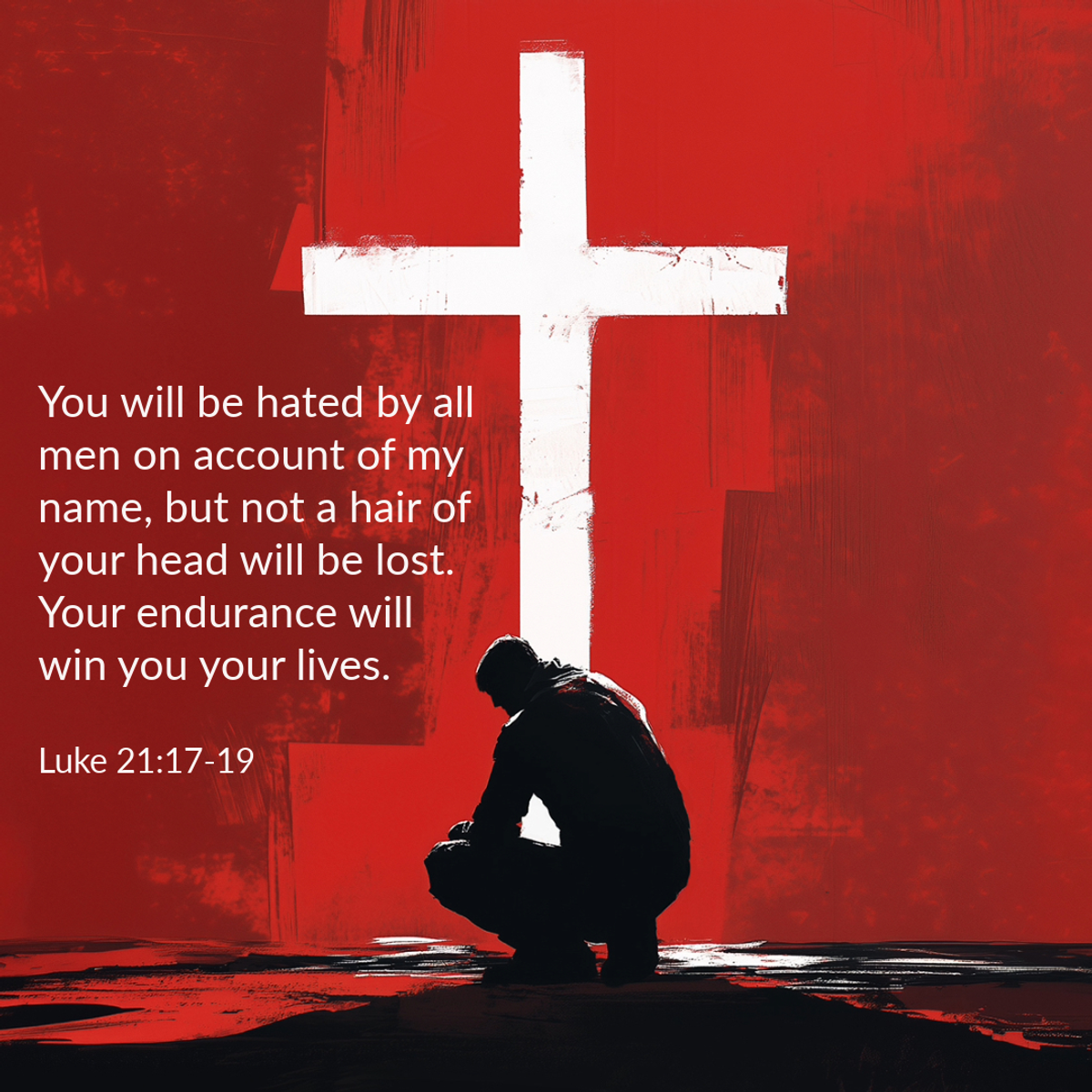Gospel

A reading from the holy Gospel according to Luke 21:5-19
When some were talking about the Temple, remarking how it was adorned with fine stonework and votive offerings, Jesus said, ‘All these things you are staring at now – the time will come when not a single stone will be left on another: everything will be destroyed.’ And they put to him this question: ‘Master,’ they said, ‘when will this happen, then, and what sign will there be that this is about to take place?’
‘Take care not to be deceived,’ he said, ‘because many will come using my name and saying, “I am he” and, “The time is near at hand.” Refuse to join them. And when you hear of wars and revolutions, do not be frightened, for this is something that must happen but the end is not soon.’ Then he said to them, ‘Nation will fight against nation, and kingdom against kingdom. There will be great earthquakes and plagues and famines here and there; there will be fearful sights and great signs from heaven.
‘But before all this happens, men will seize you and persecute you; they will hand you over to the synagogues and to imprisonment, and bring you before kings and governors because of my name – and that will be your opportunity to bear witness. Keep this carefully in mind: you are not to prepare your defence, because I myself shall give you an eloquence and a wisdom that none of your opponents will be able to resist or contradict. You will be betrayed even by parents and brothers, relations and friends; and some of you will be put to death. You will be hated by all men on account of my name, but not a hair of your head will be lost. Your endurance will win you your lives.’
Gospel Reflection
This week marks the final week of Ordinary Time in the Church’s liturgical calendar and draws us almost to the end of our journey through the gospel of Luke. Next week’s reading of the crucifixion concludes the Year of Luke. It is in this context that we need to read today’s gospel passage. Jesus and his disciples are gathered around the Temple in Jerusalem in the final days before he is to be put to death. The end is imminent and Jesus takes the opportunity to reassure the disciples that, although they are about to experience a period of distress, betrayal and persecution that will stretch well into the future, ultimately, God’s love and mercy will triumph – not only in their own lives but also in the world.
The language of passages like today’s gospel can be off-putting at times and can also be seized upon by those who would interpret scripture literally. The graphic descriptions certainly lend themselves to predictions of gloom and doom. However, we must also remember that the gospel was written some 50 or more years after the death of Jesus. At the time of writing, many of these things had already come to pass. The message for the community who were suffering through these very experiences is that they should not despair because all of this was anticipated by Jesus and that ultimately the reign of God will come about and the effort and distress that they have endured will be vindicated.
Unfortunately, the lectionary has the passage concluding at verse 19; the complete passage continues on for another 17 verses and so we don’t get the full effect of Jesus’ speech. In the latter portion, Jesus assures the disciples that the kingdom will surely come to pass. It is a promise that we affirm every time we say the Creed.
Living the Gospel – Comfort
We must remember that the gospel of Luke was written 50-plus years after the death of Jesus. Whilst Jesus may have said something like what is ascribed to him in this passage, we have to accept that the words are influenced to a great extent by the gospel writer. The gospel is not written as a biography but as a means of conveying a message about Jesus. To this end, the writer seeks to give comfort to his audience by having Jesus ‘predict’ all the things that have indeed come to pass in their community. The message to a struggling community is to ‘keep going.’
Historical Context – Expectation
When the gospel of Mark was written around the year 75 of the 1st Century, the people of that community firmly believed that the world was about to end and that Jesus’ return to earth was going to happen any day. Another 10 or so years later, the communities of the gospels of Matthew and Luke were enduring persecution and great hardship. They felt that surviving through this time of struggle would be rewarded with the return of Jesus. However, by the time of the gospel of John, another 10 years later, we see an acceptance that the end is still to come some time in the future.
Scriptural context – Apocalyptic writing
Hollywood has done very well out of movies about the end of the world and the term ‘apocalypse’ has come to have this meaning. However, ‘apocalypse’ comes from the Greek word meaning, ‘to lift a veil’ or ‘to reveal’. The apocalypse is not the end of the world, but rather the revelation that will come at the end of the world. Writings such as today’s gospel passage about what will happen at the end of the world and how God will be revealed are described in the Christian tradition as ‘apocalyptic writing’. The most famous of these writings is the book of Revelation.




